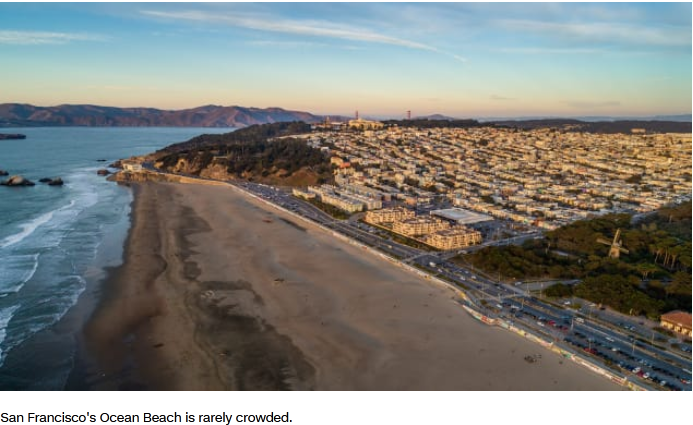Some people have a designated place to pray. I have a designated place to think. You can pray or think anywhere, of course, but some places are by design or their nature more conducive to going deeper than others. My secular cathedral is San Francisco’s Ocean Beach, found at the western edge of the city and accessible as the terminus of the undulating N Judah line of the city’s MUNI light rail. I regularly return Golden Gate Park to sort myself out and practice philosophy; it is also where I dabble in the meaning of life. Walking along this wide expanse is how I do my best thinking.
Just as churches, synagogues, and mosques are built to encourage worship, reflection, and communion with the community and one’s God—natural places can have similar effects. Natural settings focus your mind and create a sense of awe by embracing light, changing your point of reference or surrounding you with beauty.
Which began as a New Year’s goal to watch the dusk once per month when I lived in San Francisco then, at that point, transformed into a custom and now that I don’t live there, a journey.
My own practice starts at the Java Beach bistro across the Great Highway from the water. I partake in an espresso and baked good while I write in my diary until you can see the sun begin to plunge beneath the rises, and I head across the road and track down a roost in the sand.
Watching the sun liquefy into the Pacific Ocean is a reliable pinnacle insight, as the renowned clinician Abraham Maslow would have put it.
Such wonderful minutes break down the slim line between oneself and the thing being capable until there is just the actual experience. Briefly, there is no me watching the nightfall, simply dusk. Also, when I break from the dream, I start my mindwalk.
A mobile reflection
Thinking and strolling, as a cognizant pair, has attaches that date back to Ancient Greece and the Sophists who meandered and addressed in the thriving commercial center of thoughts. Aristotle’s school of Peripatetic savants was named after the corridor, or walk (peripatos), that was a significant element of his college, and it is accepted that Aristotle himself educated while moving.
A view from Sutro Heights of dusk at San Francisco’s Ocean Beach
The names of scholars who strolled to get their personalities “moving” peruses like the ordinance natural to each way of thinking major – – which I used to be.
Jeremy Bentham, John Stuart Mill, Friedrich Nietzsche and Ludwig Wittgenstein strolled to think. Thomas Hobbes’ strolling stick contained an inkwell for unconstrained note taking. Søren Kierkegaard expounded on Copenhagen’s Philosopher’s Way, Georg Hegel crossed Heidelberg’s Philosophenweg and Immanuel Kant went for a day to day walk past Königsberg’s Philosophen-damm.
In Rebecca Solnit’s “A desire for new experiences: A History of Walking” – – a book I read while going for a progression of strolls through Central Park, years after I started my Ocean Beach custom – – the writer remembers a part for Jean-Jacques Rousseau named “The Mind at Three Miles an Hour.” Rousseau made sense of the association among philosophizing and strolling, stamping pedestrianism as an option that could be more profound than simple transportation however as a cognizant social demonstration.
“Never did I suspect as much … as in the excursions I have taken alone and by walking,” he wrote in his self-portraying “Admissions.” “There is something about strolling which animates and jazzes up my viewpoints … my body must be on the transition to set my brain going.” One of Rousseau’s last works was named “Dreams of a Solitary Walker.”
For my Ocean Beach strolls, which I proceed at whatever point I visit my old home, I settle on a subject somewhat early. Some of the time it’s an inquiry, for example, “Can individuals satisfy themselves by simply choosing to be content?” or “Is religion more than morals in addition to custom?”
Be that as it may, most frequently I’ve grappled with inquiries concerning how to carry on with my life. The most life changing choice I made on that ocean side was whether to ask my sweetheart, then of a couple of months, on the off chance that I could follow her to Bangkok where she was set out toward a partnership. I concluded I should, and did. She said OK, and we’ve been hitched for 19 years at this point. On my latest visit, I figured out a goal connected with our high school little girl.
The Latin expression solvitur ambulando, “numerous things are addressed by strolling,” summarizes it pleasantly. There is an Eskimo custom, for instance, in which you stroll off your displeasure by going on until the inclination stops. You then, at that point, mark the spot prior to heading back, as an actual portrayal of the inclination’s extent. I perceive the force of such walk treatment.
This should be the spot
For my purposes, however, it’s not only the strolling. It’s the spot. Time-spurned Ocean Beach, which runs from the Cliff House on the north finish to the San Francisco Zoo close the other, is great for this mainstream strict undertaking.
It’s a fantastic region at sunset, with sky modified in the impression of the water. Add the unending waves, snarling breeze and the temporariness of my impressions and it resembles strolling through a Zen Beat sonnet. I some of the time lose my considerations in the dark ocean or tremendous mists, yet I stay, and stroll, until I’ve arrived at some resolution or resolve.
San Francisco weather conditions being reliably fall-like or colder, Ocean Beach is rarely packed. Other than surfers in 7-millimeter thick wetsuits, few get in the freezing water any more profound than their lower legs. In the middle between, individuals strolling their canines and a periodic sprinter lie significant length where nobody can hear you converse with yourself aside from the sandpipers who are excessively distracted with evading the surf to pay heed.
There are incidental territories of nightfall watchers, couples crouched under Indian covers and neo-radicals putting together a huge fire. Tall ridges separate the ocean side from a business free promenade and thruway traffic.
Lately the ridges have gradually defeated the street, shutting off an enormous segment to vehicles. Furthermore, at the edge of Golden Gate Park, there is a wild knot of Monterey cypress and other shelter trees outlined by two windmill ruins. It doesn’t feel like you’re in that frame of mind by any stretch of the imagination.
Maybe the early, and pseudo, study of psychogeography loans clarification to the way that this spot would influence me such that different spots don’t. Where mainland meets ocean is a finish of the earth and the start of another experience, the so-called edge before the jump, an exacting boundary.
Under the enormous sky and in the animating climate, everything appears to be conceivable and contemplatable here, and others like it. It reminds us to be modest and appreciative when travel uncovers areas that address us so unequivocally that by simply strolling through them improves us.



